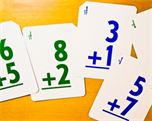 In the age of technology is it still important for students to know their basic math facts?
In the age of technology is it still important for students to know their basic math facts?
Calculators and apps seem like an easier alternative. But would we say that reading is no longer essential because technology now provides us with software that can read things for us? Of course not!
Just as in reading, knowing your basics helps to propel you. Higher order math becomes nearly impossible without knowing basic math facts. Having basic math fact fluency is the same as being a fluent reader. The more secure a child is with basic math facts the easier it is to tackle algebra and calculus down the road.
Being secure with basic math facts allows you to figure out sales tax on a bill, know what an item will cost when on sale, and be ready to negotiate that salary when applying for the dream job.
Ways to help your child learn basic math facts:
- Start out using a number grid when talking about math facts
- Make fact families (1+9=10, 5+5=10, 6+4=10, etc)
- Use manipulatives to help represent new information




